Football, Remembrance and Commemoration 2025
21/11/2025 - 5.00
Alex Alexandrou
The 2025 Remembrance period was certainly a very busy and rewarding one for the Football and War Network and its collaborations with the Army FA, Western Front Association, Charlton Athletic Museum, Leyton Orient Supporters Club and Dulwich Hamlet FC.
On the 3rd November, we held the first of two Football and War club events sponsored and supported by the Army FA and the Kent North-West and London East branches of the Western Front Association, in conjunction with our colleagues at the Charlton Athletic Museum. At the start of the event, Colin Wagstaff, the Chairman of the WFA Kent North-West branch, spoke about the work of the WFA and the partnership that has developed between the WFA, Army FA and the Football and War Network at local and national level. The event was packed out and we were treated to four excellent talks that each had a distinctive theme but connected in some way with the other talks.
First up was Clive Harris, a trustee of the museum as well as an esteemed military historian. Clive’s presentation was entitled – More Than a Game: A Whistle Stop Journey Through the History of Football and Conflict. An important aspect of Clive’s talk was how influential the British Army has been in relation to the development of football both at home and abroad and significantly how impactful football has been on the British Army.
This was followed by Steve Bolton, the noted Women’s football historian, whose talk was entitled – Dame Barker and the Rocket Girls of World War One. Not only did Steve talk about local Women’s teams close to the Charlton area, he also emphasized the importance of Women’s football during the Great War and the immediate post-war period from a social, charitable fundraising and public morale boosting perspective.
The attendees then had an opportunity to look round the museum, which it can be argued is one of the best of its kind in the country. Next up to give a presentation was Charlton fan, football and war historian and Blitzwalker guide, Steve Hunnisett. Steve’s talk was entitled - Albert Brittan - A George Medal and the Charlton Athletic Connection. A fascinating insight into civilian bravery during the Second World War. It certainly had an impact on members of the audience, as the very next evening prior to Charlton’s home match against West Bromwich Albion, two of the museum volunteers laid a tribute and flowers to the five people who died when the houses opposite the Royal Oak pub were bombed.
The series of talks were concluded with a presentation by Charlton fan and one of the founding trustees of the museum, Ben Hayes. His talk was entitled - Four Addicks at War - Charlton Athletic in World War Two, that told the stories of the club’s players who made the ultimate sacrifice such s Geoffrey Reynolds. This was a poignant recollection as Geoffrey was initially rejected by the club but given another chance due to a fortuitous encounter on a wartime train platform. As Ben stated, this was boy’s own stuff but he never had the chance to fulfil his potential in football or in life.
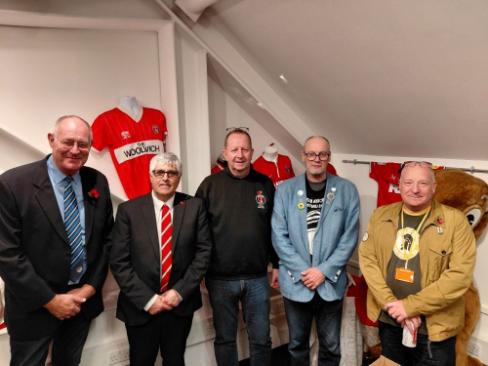
The Team – Left to Right: Steve Hunnisett, Alex Alexandrou, Ben Hayes, Steve Bolton and Clive Harris. Source: Author’s Collection
The evening was concluded at the club’s War Memorial, where the Exhortation was recited by Clive Harris and the Last Post sounded by Adam Collins, a bugler from the Irish Guards.
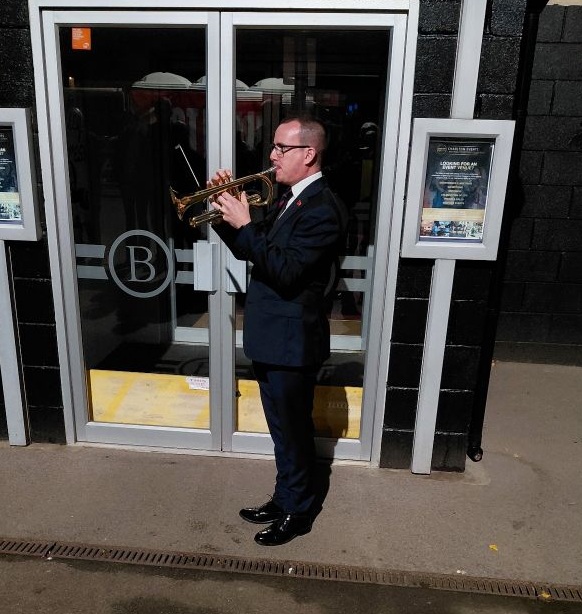
The Last Post Sounded by Adam Collins. Source: Author’s Collection
This was followed on the 6th November, with the event held at the Leyton Orient Supporters Club. There was a tremendous turnout for the event with supporters from Leyton Orient and many other clubs attending. The event was supported by a mini-exhibition that had two main themes. The first theme told the story of Clapton Orient (the forerunner to the current club) and its contribution to the Great War.
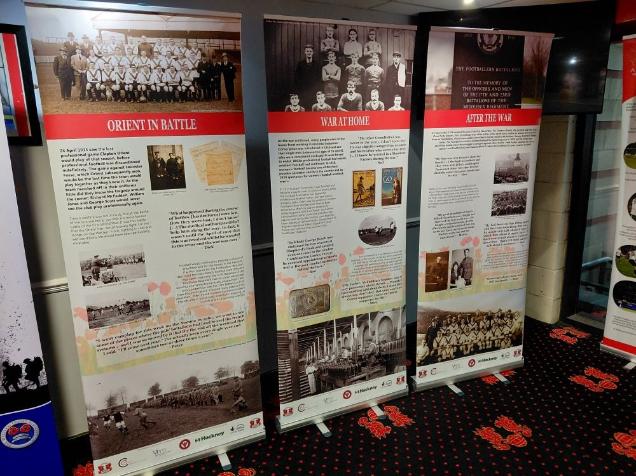
Clapton Orient and the Great War. Source: Author’s Collection
The second theme told the story of the Games of Remembrance 2014-2018, where the men and women’s representative teams from the British Army and the German Bundeswehr played each other in 2014, 2016 and 2018 to mark the centenary of the First World War in an act of Commemoration, Reconciliation and Remembrance.
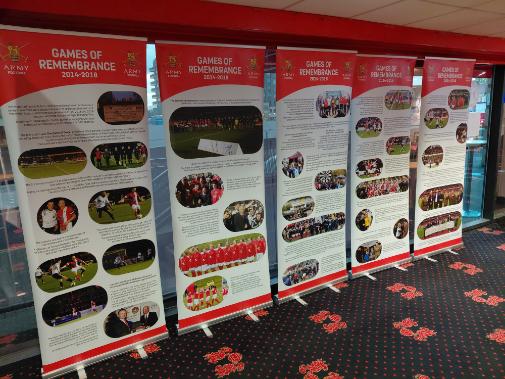
Games of Remembrance 2014-2018. Source: Author’s Collection
Neil Pearce, the Chairman of the London East branch of the WFA, kicked off proceedings with a talk about how this relatively new branch came into being; the work of the WFA at branch and national level; and how it has developed a strong relationship and partnership with the supporters’ club, football club, O’s Somme Memorial Fund (OSMF) and the 17th Pals’ Battalion Band.
Steve Jenkins, a lifelong Leyton Orient fan and currently, Deputy Chairman of Leyton Orient Supporters Club and Chairman of the O’s Somme Memorial Fund, gave a talk entitled – They Took The Lead. Steve told the story of Clapton Orient’s major contribution through the Footballers’ Battalion in the First World War in terms of signing up to fight and a number of players making the ultimate sacrifice. Notably, Richard McFadden (who was awarded the Military Medal), William Jonas and George Scott. Their personal, footballing and military stories were recounted with poignancy by Steve and left a significant impression on the audience. Steve also spoke about the Heart of Midlothian v Leyton Orient match that took place in July 2024, where over 1,000 O’s fans travelled up to Edinburgh to attend the special match at Tynecastle Stadium, between the two teams, which was arranged not only as part of Hearts’ 150th anniversary celebrations, but also to commemorate both clubs’ involvement in the Great War. Additionally, Steve highlighted how the 17th Pals’ Battalion Band helps to further commemorate the service and sacrifice of not only Clapton Orient but other clubs’ players during the Great War, for example playing at Remembrance commemorations. He then talked about the next O’s Somme Tour that will take place between the 23rd-26th July 2026. It will be a further commemoration of the sacrifice and service of players, officials, staff and supporters of Clapton Orient during the Great War.
Steve was followed by Peter Kitchen, the former professional footballer who had two stints with Leyton Orient and is the Patron of the OSMF. Peter’s talk was entitled – The O's Somme Memorial Fund. Peter spoke about the founding of, the history of and the sterling work the OSMF undertakes to commemorate, remember and memorialise the sacrifices and service of all those connected with Clapton Orient during the First World War. Peter spoke about the hard work that went into raising the finance and then organising for two permeant memorials to be built. The first was built in Flers, in Northern France and the second at the National Arboretum in England, with the latter being the first memorial to commemorate a football club at the Arboretum. Both memorials commemorate the bravery and sacrifice of the fallen of Clapton Orient. Peter went on to talk about the ongoing work of the OSMF and the other activities that it has been involved in, such as the theatre play - The Greater Game, that was performed in London in 2016 and 2018 about the club’s involvement in World War One and the Somme Battlefield tours.
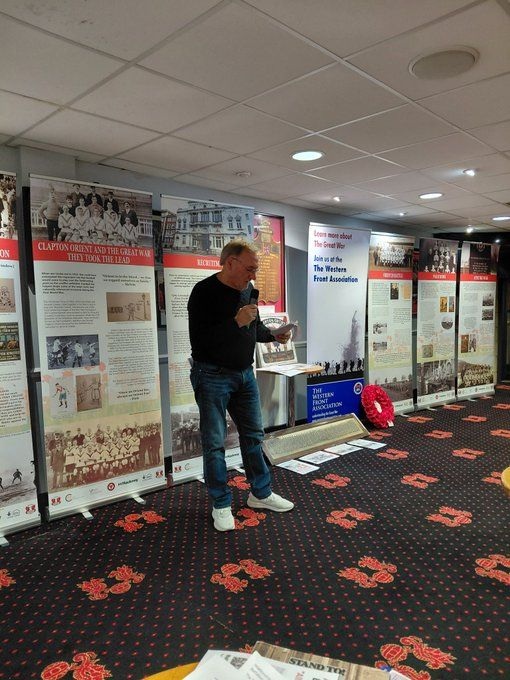
Peter Kitchen. Source: Author’s Collection
Neil Taylor, the Chief Executive of the Leyton Orient Trust then gave a presentation entitled – The Work of the Leyton Orient Trust. Neil spoke about the extensive work the Trust undertakes with the local community and schools. This involves a number of health, well-being, educational attainment and life skills activities, programmes and projects such as walking football, foodbanks and further and higher education sports focussed courses. This has included the creation of the exhibition banners on show at the event that were developed through the research and narratives of students from local schools.
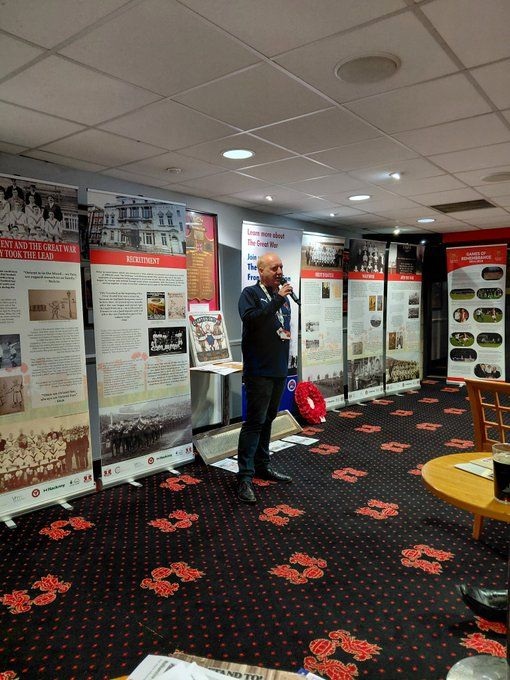
Neil Taylor. Source: Author’s Collection
I had the honour of giving the concluding talk with a short presentation entitled – The History of the Army FA and The Games of Remembrance. I firstly, spoke the partnership that has developed between the Army FA, WFA and the Football and War Network in organising and running events and activities with football clubs and museums such as the National Army Museum. Secondly, about how football in the British Army is known as The Soldiers’ Game and its ongoing importance in terms of developing fitness, leadership and morale; how it has been played wherever the Army has been stationed around the world; its impact during the National Service era; and how the Army FA Challenge Cup, is one of longest running ongoing cup competitions in world football. Finally, I talked about the Games of Remembrance 2014-1018 (as highlighted above) between representative teams from the British Army and the German Bundeswehr in 2014, 2016 and 2018 at Aldershot Town, Burton Albion, St George’s Park, Notts County and Nottingham Forest. They were supported by the late Sir Bobby Charlton, who himself had undertaken National Service. These games were about Commemoration, Remembrance and Reconciliation, as well as connecting with local communities and young people.
The event was concluded with an Act of Remembrance. Neil Pearce recited the Exhortation, followed by Steve Jenkins firstly blowing a trench whistle, then sounding the Last Post. All those present stood and remembered in solemn reflection.
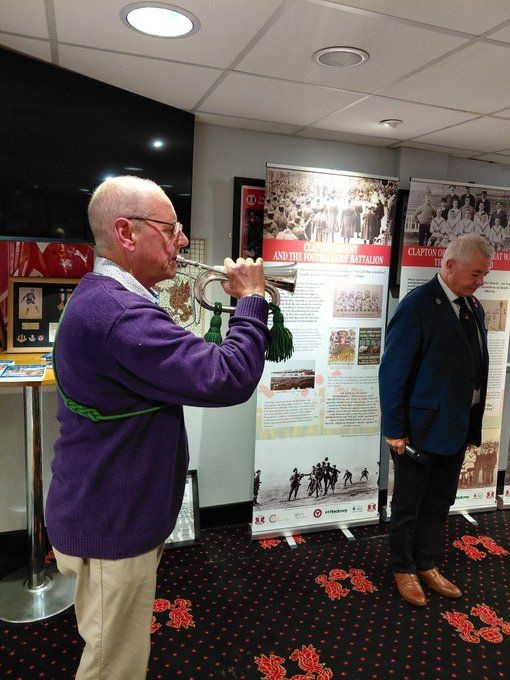
The Exhortation and Last Post – Steve Jenkins and Neil Pearce. Source: Author’s Collection
On the 8th November, on behalf of the Football and War Network, I was honoured to be invited to lay a wreath at the Dulwich Hamlet War Memorial, prior to the club’s Isthmian Premier League home match against St Albans City, which ended in a 4-2 victory for the home club in front of a sell-out crowd of almost 3,500 spectators.
This match was Dulwich Hamlet’s designated Remembrance match. It began with the traditional wreath laying ceremony at the club’s Memorial, which was attended by officials of both teams, Dulwich Hamlet History Group members, supporters and representatives of the Royal Engineers Association Football Club, with talks given by Steve Hunnisett on behalf of the Dulwich Hamlet History Group and Jack Payne, the club’s President on behalf of the club.
There then followed a number of other Remembrance activities. This included a set of talks about the fallen of Dulwich Hamlet by members of the club’s History Group and the work of the Network by myself. Roger Deason spoke about the fallen of the Great War based on his publication entitled – When Shall Their Glory Fade? Dulwich Hamlet: First World War Roll of Honour, followed by Steve Hunnisett who spoke about the fallen of World War Two based on his publication entitled – For Freedom: Dulwich Hamlet: Second World War Roll of Honour. The club announced in the match programme that both publications, which have been updated, will be free to download as PDFs from the club website in the near future.
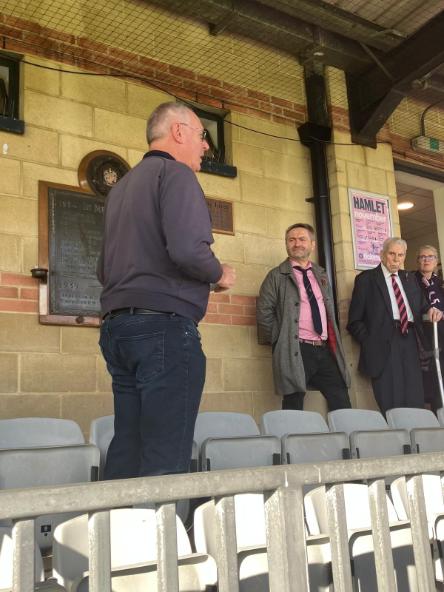
Dulwich Hamlet War Memorial - Steve Hunnisett, Roger Deason and Jack Payne. Source: Author’s Collection
I briefly spoke about the long-standing relationship the Network has with the club and the various activities and seminars we have put on for almost a decade. The relationship has grown from strength-to strength and we are now planning our next joint event for 2026. I also went on to talk about the work the Network has undertaken with the Army FA and Western Front Association. It was great to see a number of representatives from the Royal Engineers who have a proud footballing history and in recent years have developed a wonderful relationship with Dulwich Hamlet that has proved to be a great community engagement and footballing initiative.
As Ben Clasper stated in his match programme notes:
“…we welcome the Royal Engineers to Champion Hill as we mark Remembrance Weekend. It’s an event that recognises peace and the end of conflict. So somewhat sadly, it feels more relevant than ever to our current world.”
Then, before the match began the teams were led out by a Royal Engineers Standard Bearer, with wreaths laid by club officials and captains from both teams and the Royal Engineers. The Last Post was sounded and the Two Minutes Silence was impeccably and respectfully observed by the sell-out crowd, which was a wonderful representation of the diversity of supporters this community club attracts on a regular basis.
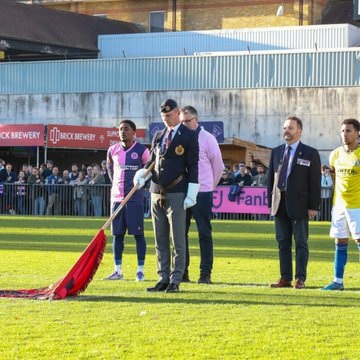
Royal Engineers Lead the Dulwich Hamlet Remembrance. Source: Dulwich Hamlet FC
Finally, on the 11th November, I represented the Football and War Network, as part of the Football Group at the Annual Service of Remembrance that takes place at The Cenotaph, Whitehall, London, organised and run by the Western Front Association. Along with representatives from the Army FA, Charlton Athletic Museum, Dulwich Hamlet FC, O’s Somme Memorial Fund, 17th Pals’ Battalion Band, Women Footballers and the First World War and the North East Essex Co-operative Academy, we paid our respects and laid wreaths in remembrance of all the footballing community who made the ultimate sacrifice in the Great War. Following this ceremony, there was a Memorial Service of Remembrance and Thanksgiving at The Guards’ Chapel, Wellington Barracks, London. This was a moving service and gave all those attending time to reflect on the significant sacrifices made and service undertaken during the First World War.
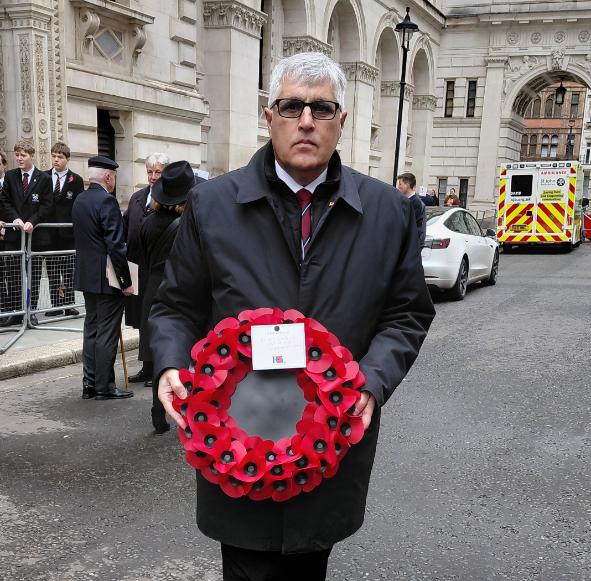
Alex Alexandrou. Source: Author’s Collection
Lest We Forget
Biography
Alex Alexandrou is Co-Founder and Chair of the Football and War Network


/prod01/wlvacuk/media/departments/digital-content-and-communications/submitted-news-images/Smelting-knife.png)
/prod01/wlvacuk/media/departments/digital-content-and-communications/images-2024/250630-SciFest-1-group-photo-resized-800x450.png)
/prod01/wlvacuk/media/departments/digital-content-and-communications/submitted-news-images/Way-youth-zone-August.JPG)
/prod01/wlvacuk/media/departments/digital-content-and-communications/images-2024/Arthi-Arunasalam-teaser.jpg)
/prod01/wlvacuk/media/departments/digital-content-and-communications/submitted-news-images/Muslim-woman-playing-football.jpg)
/prod01/wlvacuk/media/departments/digital-content-and-communications/submitted-news-images/Business-School-800x450.jpg)
/prod01/wlvacuk/media/departments/digital-content-and-communications/submitted-news-images/University-of-the-Year.jpg)